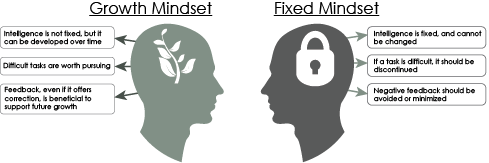35
Understanding Your Mindset
You may have heard poor performance in Math class explained by the statement, “I’m just not a Math person.” This reflects a perspective that skills (and performance levels) are natural talents for people who were “born with them.” When you approach your performance with a “you either have it or you don’t” perspective, you are basically saying that in order to excel in something, you need to have been lucky enough to have been born with that ability. This is often referred to as a fixed mindset. Fixed, meaning that it’s already set in place and not much can be done to change it. It’s not uncommon to find a fixed mindset among people who are willing to accept current performance levels, alleviating any need (or desire) to work at improvement. You probably wouldn’t agree with such a perspective if someone were referring to muscular development. Most people would admit that if you want stronger, better developed muscles, you can achieve it by resistance exercise, such as weight lifting. The thinking here is that added exercise helps the muscles grow and develop more, thus enabling someone to be stronger. That belief is an example of a growth mindset. A fixed mindset has the potential to restrain you from trying harder to improve while a growth mindset encourages expending effort to achieve higher results. There are many incredible opportunities for improving your learning power with a growth mindset. Research completed by award winning educators Dr. Carol Dweck and Dr. Lisa Blackwell introduced Brainology, a way to implement a growth mindset into the way we look at learning. Brainology is a blended learning curriculum designed to teach students the understanding that their intelligence and abilities are not fixed and can be developed through effort. When students develop a growth mindset, they gain confidence in their ability to learn. Let’s look at the difference it can make for you.
Understanding Learning in Relation to Growth and Fixed Mindsets
There are generally four elements necessary for learning. They are:
- Challenge – seeing an activity as an opportunity to perform and expand your mind
- Effort – the hard work needed in order for you to achieve something
- Feedback – the evaluation and critique of your work
- Mistakes – the ever-present potential for getting something wrong
This chart shows the different ways of looking at each of the four elements between a fixed and a growth mindset.
| Learning Element | Fixed Mindset View | Growth Mindset View |
| Challenge | Better to take on work that I know I’m already good at. | Bring on the challenge, I like discovering new things. |
| Effort | Why work harder than necessary? Avoid work. More time for fun. | Hard work is part of the thrill of learning. No pain, no gain. |
| Feedback | It’s uncomfortable & unpleasant hearing what I did wrong. | I value honest observation of my work. Feedback helps. |
| Mistakes | Avoid the humiliation of mistakes whenever possible. | I embrace the learning that comes from my mistakes. |
A growth mindset view of the benefits of making mistakes may not always be easy to embrace. Most people tend to want to avoid mistakes. Steering clear of mistakes is actually somewhat contradictory to how real learning occurs. Many of the greatest intellectual achievements of human history are the result of failed attempts. You learn a great deal from mistakes and garner added insight that you wouldn’t have if avoided doing things where mistakes can happen. Trial and error teaches you and helps you learn more than almost and other learning strategy. Click here to watch a video clip from a movie where teaching a computer to learn by making mistakes actually helps save the world.

Image Credit: Graeme Robinson-Clogg
Exercise
Try it! Click here to play a game that tests the sharpness of your mind.
